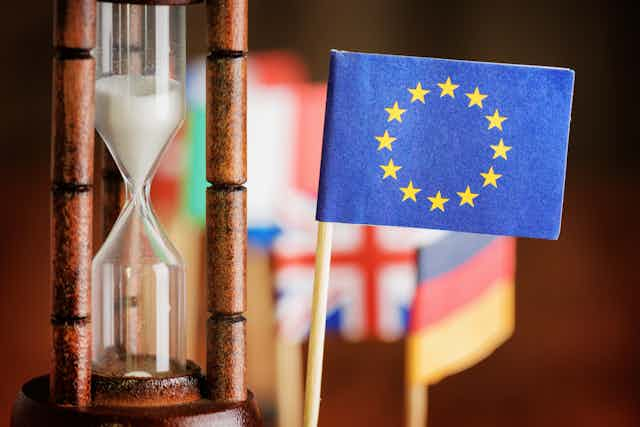Some say the true capital of the EU is not Brussels, where the European Commission, Council and Parliament lie, but rather Frankfurt, the seat of the European Central Bank (ECB). After all, it is the ECB that has done most to overcome the severest threat to European integration. In the wake of the sovereign debt crisis, ECB president Mario Draghi’s 2012 promise to do “whatever it takes” to rescue the euro is one of the most successful speeches ever made by a EU politician.

In Frankfurt, a short walk from the new ECB headquarters takes you to the Paulskirche. There, in 1848 an early parliament was elected by all the small sovereign states of the German-speaking world. It was an exciting moment, a forward-looking project towards a unified Germany. But the fire of enthusiasm was soon extinguished. The parliament lasted no more than a year, and in 1849 its representatives started to desert it until it was eventually disbanded.
For those who think that the inertia of six decades of European institution-building and legislation is sufficient to keep the EU project on track, there is a lesson to learn from Paulskirche: reneging on a grand project is always possible. Just like the first German parliament, the European Union can still fail.
Chain reaction
A chain of potentially disruptive political events looms in the EU’s future. The most explosive is the UK’s possible exit from the union. Neither the date of the referendum nor its outcome are decided at this stage, but it is entirely possible that British voters will opt out.
The people of the Netherlands will also be voting on the future of the EU, in April 2016. The country is holding a referendum on whether an association agreement should be offered to Ukraine. The result will be non-binding, but a No vote would still be a slap in the face to the EU grand plan.
The big test will be in 2017, an election year in the Netherlands (March), France (May) and Germany (September). Geert Wilders’ gains in the Dutch parliament and gains made by the Front National could boost nationalist parties in Germany, which are already capitalising on the refugee crisis and the fallout from the mass sexual assaults of New Year’s Eve.
Climate of uncertainty
In the meantime, the economic recovery is shaky and public debt still gigantic. It is possible that some peripheral states will face renewed financial troubles, not only in the south, where Portugal and Spain still suffer, but also in the east or even the north of the continent. Finland’s economy, for example, is faring particularly poorly. If conditions get worse, radical leaders may be tempted to impose protectionist measures.
On the migration front, further inflows from Africa and the Middle East could bring about a restriction of the Schengen area to a core, continental “fortress Europe” that excludes southern and eastern states. Such a decision would not only dismantle one of the main engines of European integration, but also alienate the most exposed countries of the outer borders, such as Greece.
Let’s call the whole thing off?
The irony here is that during any crisis, anti-EU parties grow stronger by collaborating across borders. Polish and Hungarian nationalist leaders are already supporting each other to be more and more defiant of EU rules.
Every setback for joint European decision-making will create an incentive to defect on mutual obligations. The tipping point could be reached if some member states refuse to contribute to the EU budget, or even withdraw their European parliament members.
At that stage, calling the whole thing off could be the easiest solution to the paralysing stalemates that would ensue. If not entirely scrapped, the EU could be downgraded and redesigned not as a political project but a regional economic pact (such as NAFTA or ASEAN) on a world map dominated by nation states.
People have the power
There are of course stabilising forces. Aside from the ECB, other banks and most of the European economic elite have much to lose from the unwinding of the EU.
The other underground driver of European integration is how deeply rooted it is in the everyday life of many Europeans. A recent study I worked on, revealed the complex social relations between a representative sample of citizens from six diverse EU member states.

The study found that one in six respondents spent at least three consecutive months living in another EU country over their lifetime, and 51% had visited a foreign EU member state, for a short vacation, business trip or visit to friends and family, in the past two years.
EU citizens cross borders virtually (almost three-quarters of the sample), when they connect on the internet or on the phone with friends and kin abroad. And they increasingly engage in international economic transactions: more than 30% shop online or transfer money to another EU member state frequently.
Do the people of Europe realise that these bits and pieces of their social world are likely to wither if the EU disappears? Are they willing to trade them in for stronger nation states?
Sociologists are not fortune-tellers; our role is simply to envisage probable scenarios. The demise of the EU is one, and many clues suggest that it is more likely now than ever before. But for both EU supporters and detractors (authoritarians excluded), the good news is that even most extreme outcomes will happen democratically. If Europeans do call the whole thing off, it will be because people have the power.


